There has been a big push in recent decades to get more Americans to talk about their feelings.
But now experts are starting to wonder whether the widespread use of therapy might be having the opposite effect and actually fueling America’s depression crisis.
They argue that the treatment, no matter how well-intentioned, can instill a “victim mentality,” where people become hyper-focused on their feelings and less engaged with the world around them, making them more depressed.
About a quarter of American adults said they had seen a therapist or psychiatrist in 2022, which is twice as high as 20 years ago and much higher than the roughly 3 percent in Britain.
Therapy language has become so common that it has permeated mainstream culture in the US. Clinical words used in counseling such as “gaslighting,” “trauma,” and “microaggressions” have become commonplace terms.
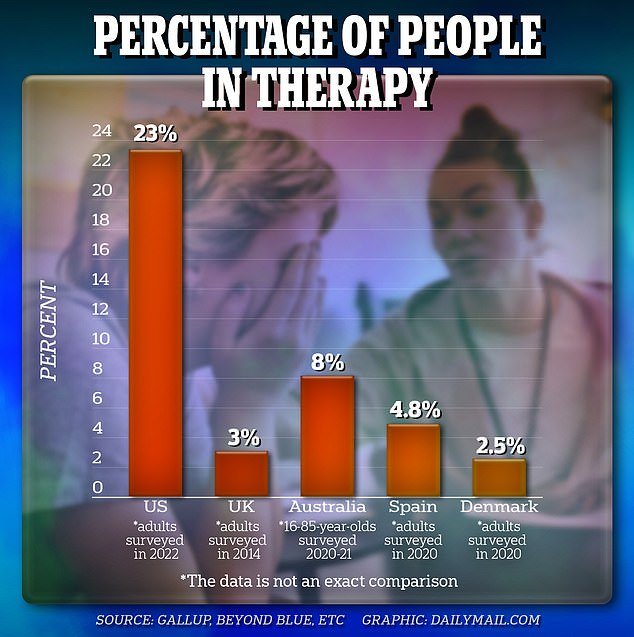
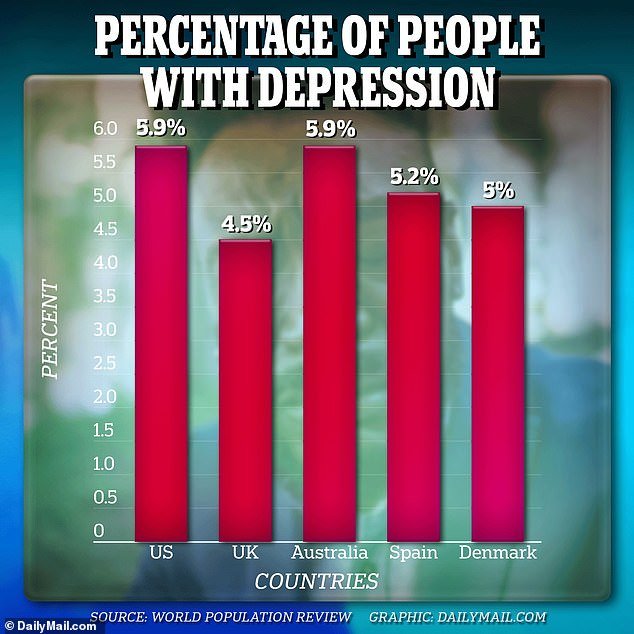

Professor Robert Dingwall, a social scientist and adviser to the British government, told DailyMail.com that, looking at the situation in America, there is concern among sociologists that people are being referred to therapy at the slightest sign of hardship in their lives.
“There is a tendency to medicalize everyday problems in the pursuit of commercial interests,” he said, whether it’s a rejection by a partner or a failed job interview.
“This is something people have been saying for 50 to 60 years, a concern voiced by psychiatrists and sociologists alike.”
This promotes a victim mentality, says Shawn Smith, a clinical psychologist based in Colorado.
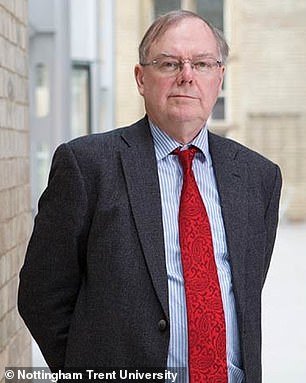

Professor Dingwall said the question of whether therapy does more harm than good is a long-standing debate in medical sociology
Mr Smith told DailyMail.com that the therapy could harm America’s youth by “encouraging children to spend, frankly, too much time staring at their own navels, and not being involved in the world and meaningful relationships and activities to develop.’
‘To some extent, therapy contributes to this. It’s a problem,” he said.
According to the American newspaper, more adults in the US have received a mental health diagnosis than adults in other high-income countries Commonwealth Fundleaving people wondering if Americans are that much sicker or just over-diagnosed.
Comedian and talk show host Bill Maher recently noted the increase in the number of Americans with mental illness, saying, “PTSD is for people who fought in Iraq, not for people who want to take their dog on a plane.”
“The way we know people are depressed is that they turn inward… and usually what you see is a relentless examination of yourself, of your thoughts, of your feelings and of your presentation,” Dr. Smith said.
Overtherapy can contribute to this, he said, “when we have children who are pointlessly scrutinizing themselves, we are causing them to turn inward and collapse inside, become self-absorbed and depressed. ‘
Professor Dingwall said the question of whether therapy does more harm than good is a long-standing debate in medical sociology.
Not only has the number of people in the US receiving therapy increased, but the amount of time spent in therapy has also increased.
In 2022, 13 percent of Americans visited a mental health professional five or more times in the past 12 months, up from six percent in 2004.
According to the Mental Health Foundation, only three percent of adults in Britain received psychological therapy in 2014.
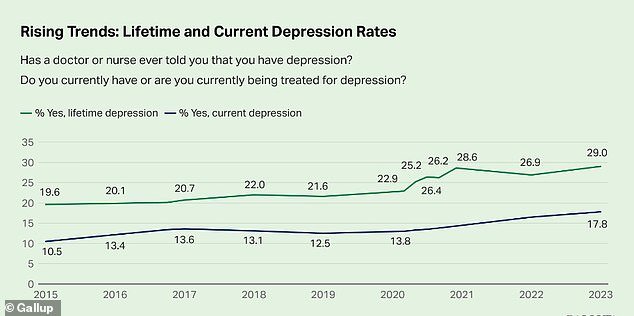

The percentage of adults reporting a diagnosis of depression has reached 29 percent, which is almost 10 percentage points higher than in 2015
Abigail Shrier, author of Bad Therapy, a book about mental health myths and the medicalization of American children, said on a podcast that she believes therapy is counterproductive.
‘Any time there is more treatment in a population, greater access for everything from breast cancer to maternal sepsis with more antibiotics, you want to see the point prevalence rates go down.


Shawn Smith, a clinical psychologist from Colorado, told DailyMail.com that medicalizing everyday problems promotes a victim mentality
‘We want to see the incidence of depression or anxiety in teenagers decrease because we know these children are inundated with treatments. Instead, it shoots up… so at least we know it doesn’t seem to be helping.”
In 2021, a group of researchers called this the “treatment prevalence paradox.”
“We refer to the increasing availability of better treatments, combined with the lack of a corresponding decrease in the prevalence of depression,” they said.
A record one in three adults in America have had clinical depression at some point in their lives, a 2023 Gallup poll found.
The percentage of adults reporting having been diagnosed with depression has reached 29 percent, which is almost 10 percentage points higher than in 2015.
And nearly one in five (18 percent) of American adults are currently depressed, another record high.
Professor Dingwall said: ‘It is difficult to disentangle the extent to which we are seeing a mental health crisis among young people, or an expansion of the definitions of mental health conditions, generating more business for pharmaceutical companies and therapists. That is the debate that needs to be had more widely.’
Dr. Smith said expanding definitions of mental health conditions could also lower the bar for some mental health conditions.
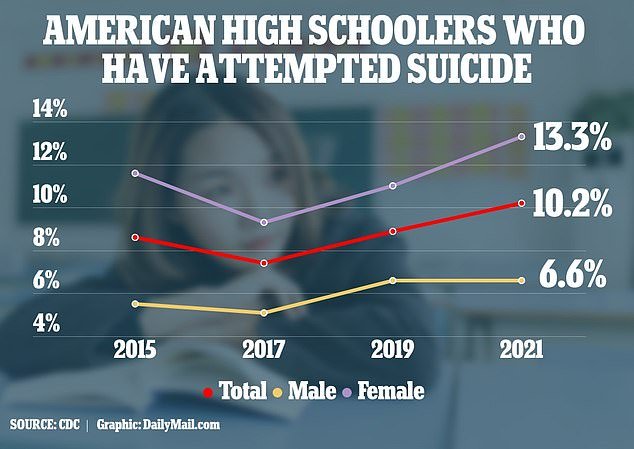

The CDC found that one in 10 U.S. high school students attempted suicide in 2021, up from 8.9 percent the year before. Women were hit hardest: 13.3 percent attempted suicide that year
He said: ‘It can certainly become a bad thing if it hinders someone who is otherwise doing fine in life and then suddenly starts to see themselves as disordered.
“And then they start treating themselves as if they’re disordered, and then they don’t do as well as they used to.”
This could become a self-fulfilling prophecy for teens, he added.
The stigma of mental illness has also decreased. Eighty-seven percent of Americans agree that having a mental disorder is nothing to be ashamed of, the American Psychological Association found.
As therapy has become more socially acceptable, says Professor Dingwall, people without mental health conditions may seek it out.
“What we may be seeing is a matter of overdiagnosis and overtreatment,” he said.
‘It’s a paradox that once you have a treatment available, more people can be brought onto the net, the treatment becomes more widely prescribed and used for what were previously considered marginal cases. That is always a risk unless these matters are investigated very carefully.’
Dr. Paul Minot, who has been a psychiatrist for nearly four decades, told the story TIME he believes that his sector is too quick to gloss over the ‘ambiguity’ of mental health care and to label diagnoses as certain, while in fact there is a gray area.
There is also a risk that people become dependent on their therapist.
“That’s something that has been recognized since the days of Sigmund Freud and the beginnings of psychoanalysis,” Professor Dingwall said.
‘If the experience of therapy becomes too comforting, a kind of addiction to it and the therapist is certainly possible and then we have what Freud called an endless therapy. That is, a conclusion that cannot properly be reached to a mutually satisfactory conclusion,” says Australian psychotherapist David White.
Depending on the type of therapy, some people may be worse off.
“There is also a debate within the therapeutic community itself,” Professor Dingwall said. ‘There is a group known as short-sighted therapists who are very critical of their colleagues because they exaggerate problems, may keep people in therapy for an unnecessarily long time, and arrange their lives in such a way that suffering increases rather than decreases.’
Short-term therapists, on the other hand, focus on practical short-term interventions, which are intended to help people move on as quickly as possible.
“The brief therapists claim to focus on solutions, rather than necessarily expecting them to delve deeply into people’s problems.”
Dr. Max Pemberton, British psychiatrist and DailyMail.com columnist, said that the over-diagnosis of mental illness “limits” young people and that therapy can mean that “they never really move forward, stuck in a land of constant victimization, chained to a grief , trauma or difficulty, and drag it around like a weight around their ankle.”
He said that while the younger generation has embraced the idea that we need to constantly examine our feelings, they are not better for it, and that people have instead become “a little more self-obsessed and a little more narcissistic.”
“So many seem to wear their problems as a badge of pride to define them,” Mr Pemberton added.
Any intervention with the potential to help also has the potential to harm patients, Shrier told me OnHerd.
“That goes for everything from Tylenol to X-rays… and that goes for psychotherapy, too.”
She listed known disadvantages of psychotherapy as things like worsening anxiety, worsening depression, feeling ineffective as if I can’t do (things) for myself, a feeling of demoralization as if I am limited by this diagnosis, and alienation from my family. members.
Shrier said there are two groups of people: one with serious mental illnesses who are undertreated and underserved in America, and one known as the “worried source.”
“These people are not suffering in any profound way. They are the stupid teenagers of the West. They are scared, worried, sad, but they don’t have a depressive disorder.’
“I don’t think they have a mental illness,” Shrier said. “I think they’re being treated as if they have a mental illness, they’re being encouraged to think they have a mental illness, they’re kind of setting themselves up for a mental illness, so to speak.”
